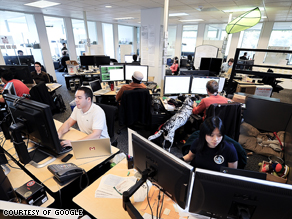
According to new research co-authored by a Brigham Young University business professor, better decisions come from teams that include a "socially distinct newcomer."
That's psychology-speak for someone who is different enough to bump other team members out of their comfort zones.
Researchers noticed this effect after conducting a traditional group problem-solving experiment. The twist was that a newcomer was added to each group about five minutes into their deliberations. And when the newcomer was a social outsider, teams were more likely to solve the problem successfully.
The research is published in the Personality and Social Psychology Bulletin.
"One of the most-cited benefits of diversity is the infusion of new ideas and perspectives," said study co-author Katie Liljenquist, assistant professor of organizational leadership at BYU's Marriott School of Management. "And while that very often is true, we found the mere presence of a newcomer who is socially distinct can really shake up the group dynamic. That leads to discomfort, but also to a better process that ultimately yields superior outcomes."
The key factor is simply whether newcomers are distinct in some way from the other group members.
What explains the results?
According to Liljenquist, newcomers in the experiment didn't necessarily ask tougher questions, possess novel information, or doggedly maintain a conflicting point of view. Just being there was enough to change the dynamic among old-timers who shared a common identity.
When a member of the group discovered that he agreed with the new outsider, he felt alienated from his fellow old-timers - consequently, he was very motivated to explain his point of view on its merits so that his peers wouldn't lump him in with the outsider.
The person who found himself disagreeing with the in-group - and instead agreeing with an outsider - felt very uncomfortable. An opinion alliance with an outsider put his social ties with other team members at risk.
"Socially, that can be very threatening," Liljenquist says. "These folks are driven to say, 'Wait, the fact that I disagree with this outsider doesn't make me weird. Something more is going on here; let's figure out what's at the root of our disagreement.' The group then tends to analyze differing opinions and critical information much more thoroughly, and that facilitates much better decision-making results."
Another revelation
The experiment also revealed a fallacy in the assumptions we make about our own effectiveness in groups. The subjects in the experiment were members of different fraternities and sororities. In general, when the newcomer was from the same sorority or fraternity as the other team members, the group reported that it worked well together, but was less likely to correctly solve the problem.
In contrast, when the newcomer was a member of a rival sorority or fraternity, the opposite was true - these groups felt they worked together less effectively, yet they significantly outperformed socially homogenous groups.
"What's really distinct about this research is that, from a self-reporting perspective, what people perceive to be beneficial turns out to be dead wrong," Liljenquist says. "The teams that felt they worked least effectively together were ironically the top performers!"
Link to original article
 Tue, July 21, 2009 at 1:46 PM in
Tue, July 21, 2009 at 1:46 PM in  Sendside Networks
Sendside Networks  Post a Comment | | tagged
Post a Comment | | tagged  Sendside
Sendside 





.jpg?__SQUARESPACE_CACHEVERSION=1237388822872)